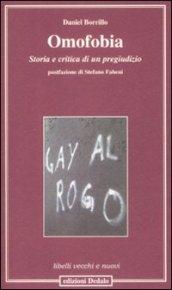
Omofobia. Storia e critica di un pregiudizio
Daniel Borrillo,
Domenico Caiati,
Fabeni Stefano
Omofobia. Storia e critica di un pregiudizio: L'omofobia, per dirla con Foucault, è un dispositivo e, come tale, viene sottoposta da Borrillo a un incessante lavoro critico che convoca non solo il diritto ma, al tempo stesso, l'intero spettro delle scienze umane: antropologia, filosofia, storia delle religioni, psicoanalisi. E solo a questa condizione, in effetti, che diventa possibile procedere a una vera e propria decostruzione dell'atteggiamento omofobo. Attraverso le quattro grandi sezioni in cui si articola il testo, l'autore interroga l'odio dell'omosessuale come fenomeno che attraversa e struttura una gran parte della nostra storia e dei nostri comportamenti quotidiani; l'omofobia si situa, al tempo stesso, sul piano dell'irriflesso e del simbolico, dell'habitus e dell'immaginario: in altre parole, di quell'ideologia dominante che Daniel Borrillo mette radicalmente in questione. Homophobia, to borrow from Foucault, is a device and, as such, is subjected to incessant critical work to a Banjo that summons not only the right but at the same time, the entire spectrum of the social sciences: anthropology, philosophy, history of religions, psychoanalysis. And only on this condition, in fact, that it becomes possible to carry out a real deconstruction of homophobic attitude. Through the four major sections of the text, the author questions the hatred of homosexual as a phenomenon that crosses and structure a large part of our history and of our daily behavior; homophobia is, at the same time, in terms of unreflecting and of the symbolic, the imaginary and habitus: in other words, the dominant ideology that Daniel Borrillo puts radically into question.
Al momento non disponibile, ordinabile in 3 settimane circa
Dettagli Libro
- Titolo: Omofobia. Storia e critica di un pregiudizio
- Autore: Daniel Borrillo, Domenico Caiati, Fabeni Stefano
- Curatore:
- Traduttore: Caiati D.
- Illustratore:
- Editore: Dedalo
- Collana: LIBELLI VECCHI E NUOVI
- Data di Pubblicazione: 2009
- Pagine: 161
- Formato:
- ISBN: 9788822055132
- Società - Società






